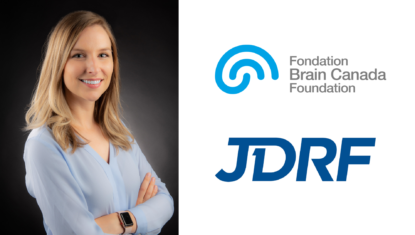09/03/2022
Ottawa, Ontario — Wednesday March 9, 2022

Last summer, Brain Canada and JDRF officially launched the JDRF Canada – Brain Canada Addressing Mental Health in Type 1 Diabetes Team Grants, a unique program that supports research on interventions that address mental health concerns in people with type 1 diabetes (T1D).
Living with a chronic illness like diabetes is hard. As a result of the burden of diabetes management, people with T1D are at an increased risk of developing mental health disorders such as depression, anxiety, suicidal ideation, eating disorders, and diabetes distress, a clinically validated term describing the powerlessness, stress, guilt, relentless worry, and denial that comes with living with diabetes and the burden of self-management. We know that people with T1D who develop mental health disorders, particularly depression and diabetes distress, have a lower quality of life, have worse glycemic control (i.e., higher HbA1c), measure blood glucose less often, suffer more frequent/severe hypoglycemia and diabetic ketoacidosis episodes, and are admitted to the hospital more frequently. Conversely, resilience, empowerment, a good support network, and wellness are linked with high quality of life and health outcomes in people with T1D.
Mental health is rarely a central aspect of day-to-day diabetes management and concerns often remain unidentified or unaddressed until they become serious and challenging to manage. Although mental health interventions are known to improve quality of life and outcomes for some people with diabetes, few are regularly implemented in standard care.
The JDRF Canada – Brain Canada Addressing Mental Health in Type 1 Diabetes Team Grants provide up to $250,000 over two years to fund the development and testing of three sustainable, scalable projects which aim to improve support for people in Canada who live with T1D and are affected by mental health disorders. These strategies could translate into better quality of life and diabetes-related health outcomes for people living with T1D.
Learn more about the CHEO Research Institute project:
Teaching Adolescents with type 1 diabetes Self-compassion (TADS) to reduce diabetes distress: A randomized controlled trial
Self-compassion is a practice that involves acting the same way towards yourself as you would with friends and loved ones, and that you are kind and understanding towards yourself. Since self-compassion is a skill that can be taught, the team believes that it could be a strategy to improve mental health issues in youth with T1D, like diabetes distress.
The aim of the study is to assess the effectiveness of a mindful self-compassion program on improving the diabetes distress experienced by youth aged 12-17 years with T1D. The mindful self-compassion program will consist of weekly virtual 1.5-hour sessions/workshops for 8 weeks, led by a trained facilitator. It will cover a variety of self-compassion practices, such as dealing with difficult emotions and developing a kind inner voice. The team anticipates that symptoms of anxiety, depression, disordered eating, and suicidal ideation will be lower in the mindful self-compassion group compared to the control group. This study has the potential to lower diabetes distress, the most common mental health problem experienced by youth with T1D, by increasing their self-compassion. Ultimately, the team plans to advocate for the inclusion of such programs in standard care for youth across Canada, thereby directly impacting their mental health and blood sugar control.
The JDRF Canada – Brain Canada Addressing Mental Health in Type 1 Diabetes Team Grants have been made possible by the Canada Brain Research Fund (CBRF), an innovative arrangement between the Government of Canada (through Health Canada) and Brain Canada, and JDRF Canada.
Content provided by JDRF.
